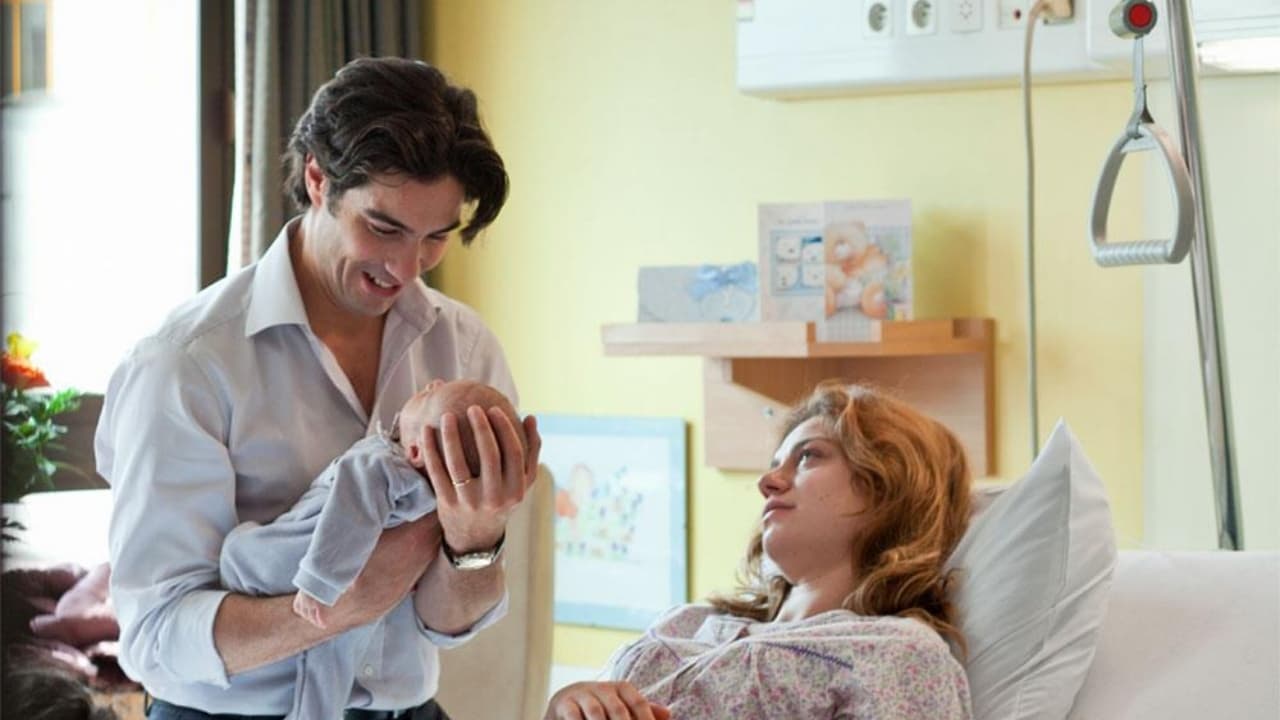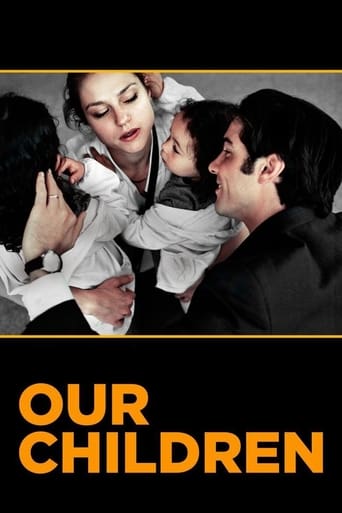

Why so much hype?
... View MoreAlthough it has its amusing moments, in eneral the plot does not convince.
... View MoreI was totally surprised at how great this film.You could feel your paranoia rise as the film went on and as you gradually learned the details of the real situation.
... View MoreThis is a dark and sometimes deeply uncomfortable drama
... View MoreBelgian Director Joachim Lafosse takes on a very uncomfortable subject. We are practically told the subject of the film from the beginning when we see 4 small coffins coming out of a plane. We then go back to happier times when the central couple first get together. Obviously this is going to lead up to the tragic finale when the 4 children are murdered, so there is always an impending sense of doom and unease when watching the film. The cinematography adds to this very well as the frames always have something out of focus in the foreground, almost a voyeuristic perspective like they are being watched all the time. Also the frame always seems cluttered and the shots always close up giving a claustrophobic feel.The couple in question (most notably the wife) undergoing this scrutiny and claustrophobia are Mounir (Tahar Rahim) and Murielle (Emilie Dequenne). Mounir is a Morroccan immigrant who legally lives in Belgium because of his adoptive father Dr Andre Pinget (Niels Arestrup). He lets Mounir live in his house and has also given him a job at his practise. As a man of considerable wealth, Dr Andre Pinget helps the couple when they get married and has them both living with him, and tags along on their honeymoon. He has also married one of Mounirs sisters, purely as an arrangement so she can live in Belgium. Basically I see Dr Pinget as a man who wants to free people from the 'oppressive' Muslim culture of Morrocco so they can live 'free' lives in Belgium. With the whole arrangement of Mounir and Murielle living under his roof with 4 children, and with Dr Pinget's influence over Mounir, this proves very stifling for Murrielle. Murielle is expected to look after the children at all times and is blamed entirely if anything goes wrong. While Dr Pinget proves useful for any medical and financial assistance, he lacks emotional sensitivity and compassion. He makes Murielle feel guilty every time she protests about the situation and feels she can't talk to her husband as he always agrees with Dr Pinget. With seemingly no way out, Murielle gradually sinks into a downward spiral towards a pit of depression. The face of happiness you often see at the start of the film descends into a face of despair and desperation. This obviously leads to the tragic event which is done with subtlety, but still shocking.This is based on a true story which took place in Belgium. I feel the Director re created these events not to gain the understanding of an audience, but to have the audience ask questions and come to their own understanding of such an horrific event. I feel one point which is raised and not often discussed in reviews I have read is about how in some ways Western culture can be just as oppressive as Muslim culture. I feel this is significant, at a time where many of the worlds problems tend to be blamed on Muslim culture, which I feel is a very misguided view. Part of the blame of Murielles downfall is because of a masculine household, lack of compassion from the male characters and inability to express true feelings. I found the only compassionate character was Mounir's mother, a devout Muslim. She is the only person who shows sympathy towards Murielle, especially in a tender scene where they embrace at the airport. The desperation in Murielle's face and her inability to let go shows her desperation for feminine connectivity.The more you think about it, more questions arise. Did Murielle really have a hard time? She has everything she needs. Does she have a history of mental illness? The film does not hint at this and is left open. Is Dr Pinget a bad person or is he doing what he feels is right? Should we feel sympathy for Murielle? These are only some of the questions I had. I felt there where too many questions and some story threads were left unfinished. One of the biggest flaws of the movie was the fact that Mounir was not featured in the final 30 minutes of the movie. I felt his character needed some closure and at least a scene with Dr Pinget. As far as performances are concerned, it was expertly acted. I feel Emilie Dequenne is one of the best performances I have seen this year so far this.A memorable film for obvious reasons, but not a film I would want to experience again! Check out my film review blog - www.projectionistreview.wordpress.com
... View MoreTwo arcs propel Joachim Lafosse's remarkable Our Children. The most obvious and significant is the heroine Murielle's decline from a beautiful, loving, young spirit to a depressed, oppressed, despairing drudge. She proves the dictum, Biology is destiny. From her honeymoon through her four child bearings she loses her sense of self, her liberty, her control over her life. Her last action is her tragic resolve to save her three daughters and one son from their being ruined by the sexist, patriarchal system that destroyed her. Unable to grant them liberty she gives them death. Though her Moroccan husband Mounir claims he doesn't want to raise his daughters in his sexist homeland, Murielle is destroyed by a European patriarch in Belgium. Dr. Pinget provides the antithetic arc. His apparent generosity and care are gradually exposed as heartless self-serving power and authority. Having married a young Moroccan woman, he leaves her in her homeland but brings one of her brothers, then eventually the other, to Europe variously to serve him. When his hopes to have Mounir join his medical practice are dashed, he hires him for office work. He pays for Mounir and Murielle's honeymoon, then agrees to join them. He shares his house with them, then to keep them buys them an estate where he again lives with them. His callousness towards Murielle drives her tragedy. The tension between the Moroccan family and the fat, hedonistic, impotent but suffocatingly powerful white European doctor adds another compelling theme. This domestic tragedy is also a parable for European colonialism. The white power insinuates itself into its colony, funds it, wins its trust and affection, imposes its own culture, but for all its pretense of generosity and care insists on dominating it and imposing its will. Any move to independence is suppressed as an affront to nature and to reason. (The film's original French title is A Prendre la raison, or Insanity.) That ruthless power is what the male patriarchy shares with the European colonial tradition.The film opens with a woman crying, begging that her four children be buried in Morocco. So it's a whodunit. Except here the killer is the true victim. For more see www.yacowar.blogspot.com.
... View MoreThis film by Belgian director Joachim Lafosse speaks about the imminent clash of civilizations between two young people as the film contains numerous references to differences of culture. As a film about an important contemporary topic which is liable to draw diverse opinions,Our children largely fails to make great impact on viewers as it does not ask pertinent questions. What bothers the most is that the most elementary question of a mother killing all her five children without any remorse is never answered ? It can be surmised that the reason for this absence of a direct reply lies in the film being merely an ordinary story where viewers are made to be mute spectators of a series of incidents happening in the lives of the protagonists. Although the film features good acting by veteran actors Niels Arestrup, Emilie Dequenne and Tahar Rahim viewers might develop a feeling that the film fails to effectively deal with its main plot. It is observed that most films about murders in a family tend to sensationalize the issue by taking sides. A viewer would feel happy to learn that Joachim Lafosse chose to deliberately avoid such an artistic trap. Lastly, it is this quality which would work in his favor. Belgian film 'Our Children'/A Perdre La Raison is based on the real life incident involving a Belgian woman Geneviève Lhermitte who killed her five children in 2007.It was part of 'Un Certain Regard' section at 65th Cannes International Film Festival 2012.
... View MoreBelgian screenwriter and director Joachim Lafosse's fifth feature film which he co-wrote with French screenwriter Thomas Bidegain and Belgian screenwriter Matthieu Reynaert, is based on a real-life incident that took place in Brussels in 2007 where a 42-year-old woman killed her five children. It premiered in the Un Certain Regard section at the 65th Cannes International Film Festival in 2012, was shot on location in Morocco and Belgium and is a France-Belgium-Luxembourg-Switzerland co-production which was produced by producers Jacques-Henri Bronckart and Olivier Bronckart. It tells the story about Mounir and Murielle, a couple in their late twenties who lives in Brussels, Belgium. Murielle is a Belgian elementary school teacher and Mounir, a Moroccan and former youth worker without a permanent residence certificate. After deciding to get married, Mounir shares the great news with his close friend André Pinget, a wealthy doctor who has been like a father to him through most of his childhood and helped him and his family in many ways. André gives Mounir a full-time job at his practice, let's him and Murielle live with him in his apartment and Murielle and Mounir is happily married, but as time goes by André's ways of making himself indispensable and his insisting involvement in their lives begins to stagnate their relationship.Precisely and commandingly directed by Belgian filmmaker Joachim Lafosse, this somewhat biographical and fictional story which is narrated mostly from the female protagonist's viewpoint, draws an intimate and nuanced portrayal of a Belgian teacher's saint like suffering after marrying, becoming a mother and being second-rated by a husband who is more committed to honoring the wishes of his generous and demanding father figure. While notable for it's naturalistic milieu depictions, fine production design by production designer Anna Falguères, cinematography by Belgian cinematographer Jean-François Hensgens and realism, this narrative-driven and dialog-driven psychological drama triangle depicts an in a sense provocatively heartrending, due to it's non-judgmental and empathic portrait of the main character, study of character and contains an efficient classical score which emphasizes the film's tragic undertones.This finely paced character piece about emigration, conflicting human relations, motherhood, mental exhaustion and paper marriage which is set in Brussels, Belgium during a summer in the early 21st century and which has been chosen as Belgium's submission to the Academy Award for Best Foreign Language Film at the 85th Academy Awards in 2013, is impelled and reinforced by it's cogent narrative structure, abrupt editing by film editor Sophie Vercruysse, substantial character development, the poignant and impressive acting performances by Belgian actress Émilie Dequenne who comes close to her unforgettable acting performance in the Dardenne brothers' "Rosetta" (1999) and the fine acting performances by French actors Niels Arestrup, Tahar Rahim and Belgian actress Stéphane Bissot. A concentrated and ambivalent love-story which gained, among other awards, the Un Certain Regard Award for Best Actress Émilie Dequenne at the 65th Cannes Film Festival in 2012.
... View More